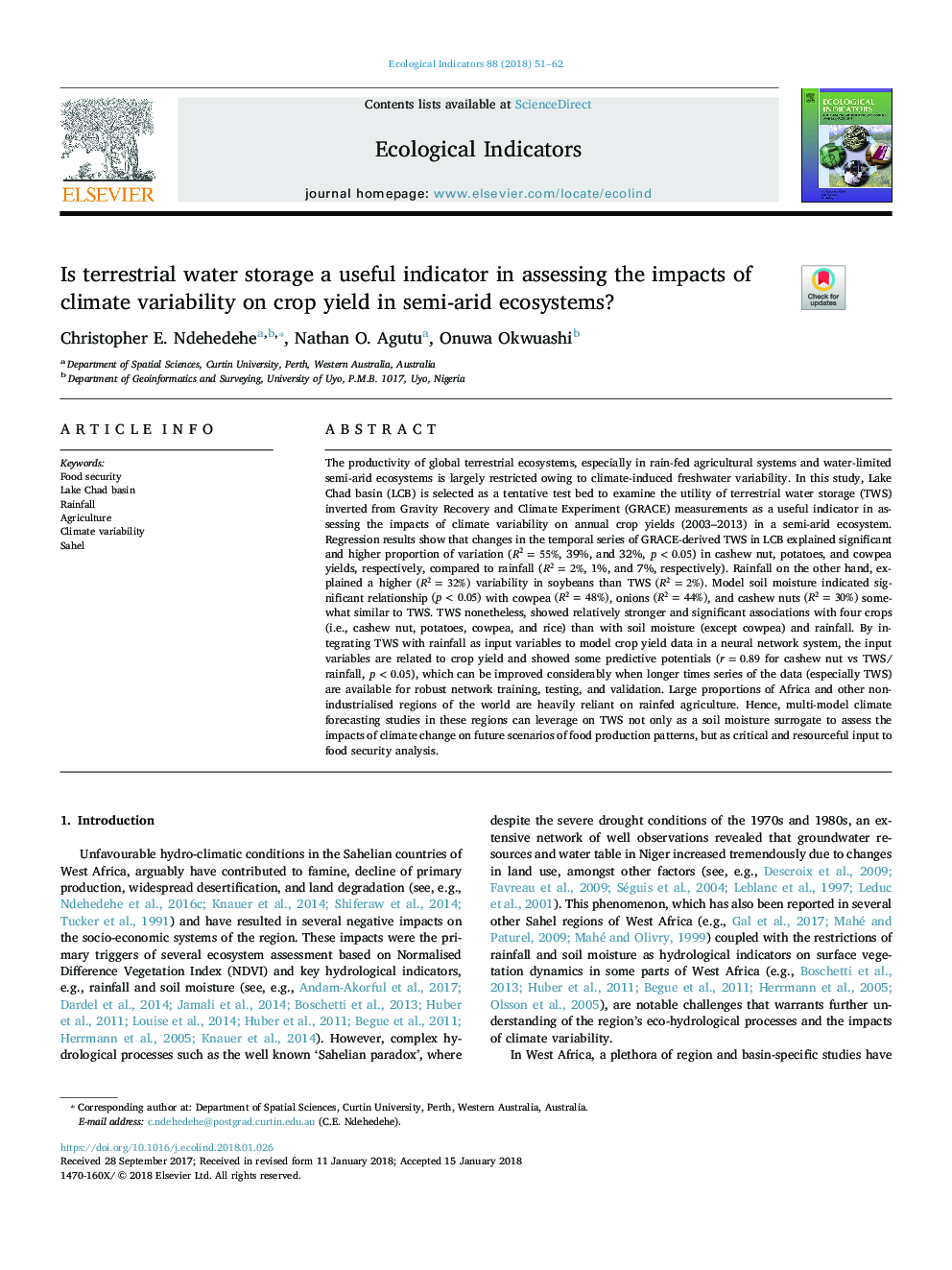| کد مقاله | کد نشریه | سال انتشار | مقاله انگلیسی | نسخه تمام متن |
|---|---|---|---|---|
| 8845549 | 1617114 | 2018 | 12 صفحه PDF | دانلود رایگان |
عنوان انگلیسی مقاله ISI
Is terrestrial water storage a useful indicator in assessing the impacts of climate variability on crop yield in semi-arid ecosystems?
ترجمه فارسی عنوان
آیا ذخیره آب های خشک یک شاخص مفید برای ارزیابی اثرات تغییرات اقلیمی بر عملکرد محصول در اکوسیستم های نیمه خشک است؟
دانلود مقاله + سفارش ترجمه
دانلود مقاله ISI انگلیسی
رایگان برای ایرانیان
کلمات کلیدی
امنیت غذایی، دریاچه چاد حوضه، بارش باران، کشاورزی، تغییرات اقلیمی، ساحل،
موضوعات مرتبط
علوم زیستی و بیوفناوری
علوم کشاورزی و بیولوژیک
بوم شناسی، تکامل، رفتار و سامانه شناسی
چکیده انگلیسی
The productivity of global terrestrial ecosystems, especially in rain-fed agricultural systems and water-limited semi-arid ecosystems is largely restricted owing to climate-induced freshwater variability. In this study, Lake Chad basin (LCB) is selected as a tentative test bed to examine the utility of terrestrial water storage (TWS) inverted from Gravity Recovery and Climate Experiment (GRACE) measurements as a useful indicator in assessing the impacts of climate variability on annual crop yields (2003-2013) in a semi-arid ecosystem. Regression results show that changes in the temporal series of GRACE-derived TWS in LCB explained significant and higher proportion of variation (R2=55%, 39%, and 32%, p<0.05) in cashew nut, potatoes, and cowpea yields, respectively, compared to rainfall (R2=2%, 1%, and 7%, respectively). Rainfall on the other hand, explained a higher (R2=32%) variability in soybeans than TWS (R2=2%). Model soil moisture indicated significant relationship (p<0.05) with cowpea (R2=48%), onions (R2=44%), and cashew nuts (R2=30%) somewhat similar to TWS. TWS nonetheless, showed relatively stronger and significant associations with four crops (i.e., cashew nut, potatoes, cowpea, and rice) than with soil moisture (except cowpea) and rainfall. By integrating TWS with rainfall as input variables to model crop yield data in a neural network system, the input variables are related to crop yield and showed some predictive potentials (r=0.89 for cashew nut vs TWS/rainfall, p<0.05), which can be improved considerably when longer times series of the data (especially TWS) are available for robust network training, testing, and validation. Large proportions of Africa and other non-industrialised regions of the world are heavily reliant on rainfed agriculture. Hence, multi-model climate forecasting studies in these regions can leverage on TWS not only as a soil moisture surrogate to assess the impacts of climate change on future scenarios of food production patterns, but as critical and resourceful input to food security analysis.
ناشر
Database: Elsevier - ScienceDirect (ساینس دایرکت)
Journal: Ecological Indicators - Volume 88, May 2018, Pages 51-62
Journal: Ecological Indicators - Volume 88, May 2018, Pages 51-62
نویسندگان
Christopher E. Ndehedehe, Nathan O. Agutu, Onuwa Okwuashi,
